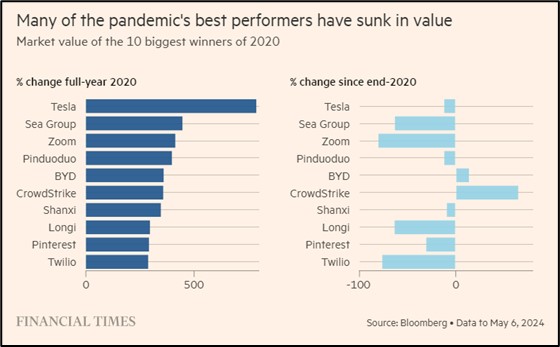Daily Comment (May 8, 2024)
by Patrick Fearon-Hernandez, CFA, and Thomas Wash
[Posted: 9:30 AM EDT] | PDF
Our Comment today opens with some notes on the stock market winners of the pandemic years and fundamentals in the silver market. We next review several other international and US developments with the potential to affect the financial markets today, including notes on Japanese and Swedish monetary policy and prospects for inflation in the US.
Global Stock Markets: The Financial Times today carries an interesting report noting that the 50 large-cap stocks that appreciated the most in 2020, amid coronavirus pandemic, have lost about one-third of their value, or $1.5 trillion, since then. The data shows just how short-lived many of the changes and disruptions of the pandemic actually were. Importantly, we’ve noted similar snap-backs in some key economic data series.
- Without a doubt, the pandemic also caused many longer-lasting stock market winners and economic changes.
- Nevertheless, the dramatic short-term disruptions in the finance and economic data will make it harder for economists and investment strategist to use pandemic-era figures for their models in the future.
Global Silver Market: Data from the International Energy Agency shows China and other countries around the world are boosting their investment in photovoltaic cell factories. Since solar cells use a lot of silver because of its high electrical conductivity and other features, the new investment is driving increased silver demand and higher silver prices. The data helps explain why we have recently added silver to our more aggressive asset allocation strategies.
Japan: At an economic conference today, Bank of Japan Governor Ueda said he would be willing to hike interest rates earlier than planned if consumer price inflation looks set to worsen again. He specifically cited a risk that the weak yen (JPY) could feed into broad price increases. The statement adds to the evidence that many major central banks are pulling back from their previous predisposition to cut interest rates.
Sweden: Despite the “higher for longer” approach to interest rates taken by the Federal Reserve, the Bank of Japan, and other major central banks, other institutions are proceeding with cautious rate cuts. The Riksbank today cut its benchmark short-term interest rate from 4.00% to 3.75%, as widely expected. That makes Sweden only the second rich, industrialized country to cut rates this cycle, following Switzerland’s cut in March. Both central banks are responding to Europe’s recent soft economic growth and falling inflation.
United Kingdom: In a fresh sign of chaos and falling political fortunes, two members of parliament for the ruling Conservative Party have defected to the main opposition Labour Party in the last two weeks. In an especially dramatic move yesterday, Dover MP Natalie Elphicke “crossed the floor” just moments before the start of Prime Minister’s Questions, the weekly debate in the parliament chamber between Prime Minister Sunak and Labour Leader Starmer. The developments add to the sense that the Conservatives will lose big in this autumn’s elections.
Argentina: Faced with persistently high inflation that has eroded the purchasing power of the peso (ARS) and forced consumers to pay for purchases with huge wads of bills, the central bank for the first time has begun printing 10,000-peso notes. The new notes are five times more valuable than the largest previous denomination, consisting of 2,000-peso notes.
United States-China: The US Commerce Department has revoked export licenses that until now allowed Intel and Qualcomm to supply semiconductors to Chinese telecom technology giant Huawei for its laptop computers and mobile phones. The move signals that the Biden administration intends to keep up its effort to weaken China’s geopolitical threat by impeding the country’s technological development. The change is also likely to spur Chinese retaliation, further advancing the spiral of tensions between Washington and Beijing.
US Consumer Price Inflation: While President Biden contends with the political fallout from the high inflation of 2022 and 2023, new analysis from Axios warns that if former President Trump is re-elected in November, key planks of his agenda could boost inflation again. Specifically, the analysis says Trump’s goals such as increasing import tariffs, cutting taxes, clamping down on immigration, and pressuring the Fed to keep interest rates low would all be potentially inflationary.
- We take no position on who should win the election, as it remains too close to call.
- Rather, we think the significance of the Axios analysis is that broader geopolitical forces and domestic political realities in the US are likely to make the economic environment more inflationary going forward, no matter who wins the election.



